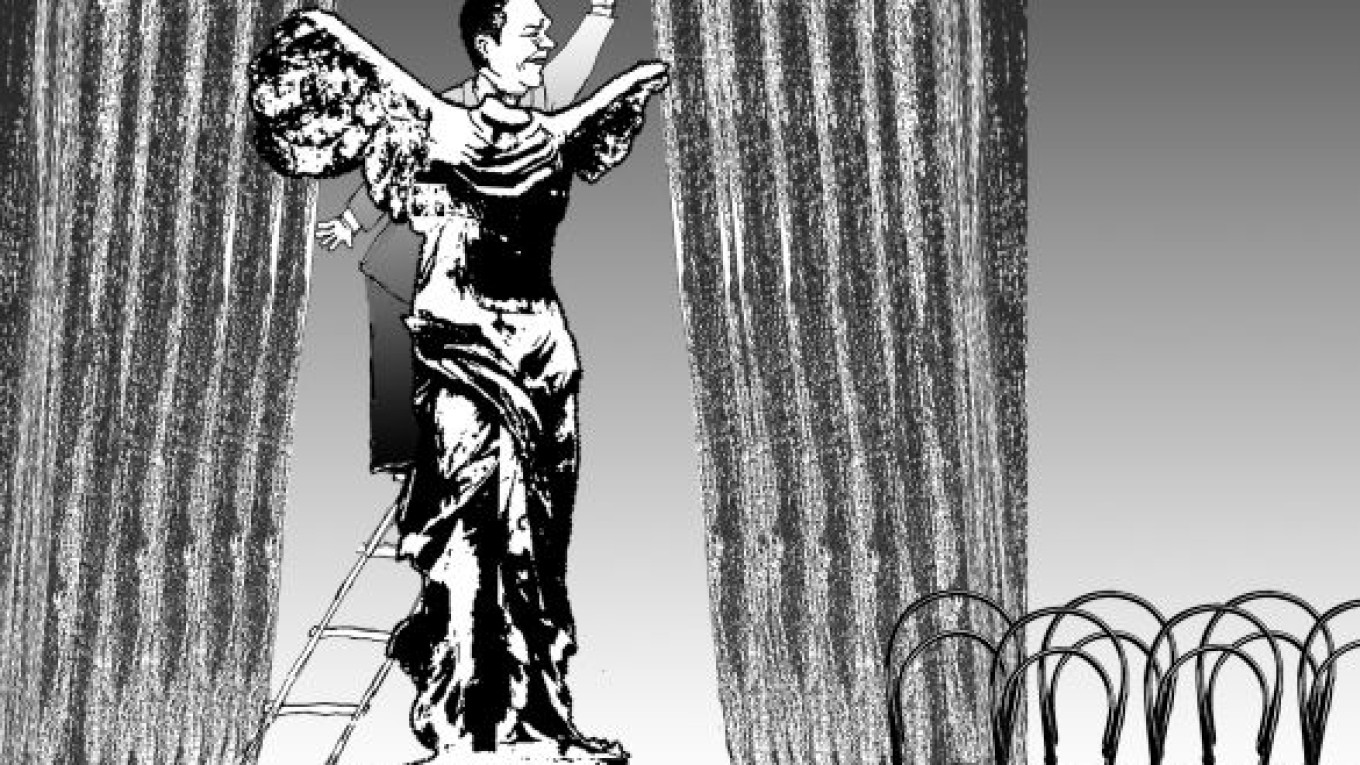Thursday was a great day for Viktor Yanukovych as he was sworn in as the fourth president of post-Soviet Ukraine. Although Yanukovych’s road to victory was a bumpy one after suffering a serious blow to his reputation amid allegations of vote rigging in the 2004 presidential election, he is now basking in his amazing political comeback.
The one drawback for Yanukovych on inauguration day, however, was the half-empty parliament, with Prime Minister Yulia Tymoshenko’s supporters refusing to attend the ceremony. Everything else went as planned with the exception of the inevitable glitches and minor surprises.
Perhaps the most significant twist was a decision by Yanukovych to attend an early morning service at the Kiev-Pechersky Monastery led by Patriarch Kirill, who came to Kiev for the inauguration. It had been announced a short time earlier that Yanukovych would not attend. The problem is that Ukrainian Orthodox believers have historically been split into three major branches. The first branch recognizes the authority of the Moscow patriarch. The second group follows the guidance of the independent Ukrainian Orthodox Church that the Moscow patriarch excommunicated long ago. The third branch, the so-called Uniates, preserves all of the Orthodox rites and customs but recognizes the supremacy of the pope in Rome.
Unlike former President Viktor Yushchenko, Yanukovych is demonstrably religious and makes no effort to hide his allegiance to the Moscow patriarch. According to informed sources, that is why Yanukovych’s close advisers strongly recommended that he remain absent from the prayer service on his inauguration day in order not to give his critics an opportunity to accuse him of having a pro-Russian bias. Yanukovych apparently agreed to stay away but changed his mind at the last moment and went to the monastery anyway. As anticipated, his political opponents heaped criticism on him for “running to the Moscow ‘pope’ to get his blessing.”
But those accusations were quickly eclipsed by the news that the European parliament had passed a resolution on Yanukovych’s inauguration day that officially gave Ukraine the right to apply for membership in the European Union. Obviously, the timing was no coincidence. Brussels apparently listened to those who say if the EU embraces Yanukovych, he will change his pro-Russian stance and become a willing partner with the West.
Yanukovych’s decision to make Brussels his first visit rather than to Moscow raised a lot of eyebrows. But his opponents reject the notion that the visit carries a symbolic meaning. After all, five years ago, the strongly pro-Western Yushchenko went to Moscow for his first official visit abroad.
Yanukovych can expect the usual struggle for power and position within his new government, but he must first decide the main question: how to dismiss Tymoshenko as prime minister and appoint someone else in her place.
The Ukrainian constitution does not allow a new president to disband the former government. Only the parliament can approve a new prime minister. Thus, even though Tymoshenko lost the presidential election, she can nevertheless continue to head the Cabinet as long as the government coalition she formed remains intact.
To prevent that from happening, though, Yanukovych’s Party of Regions is negotiating with other political groups in the parliament in hopes of forming a new coalition. But the talks are going roughly because the parliament is extremely fragmented. No individual party has enough votes to form a government single-handedly, and the political and ideological differences between them are so great as to be practically insurmountable. That is why the whole process might end with early parliamentary elections. Sergei Tigipko, the former Central Bank chairman who finished third in the presidential election with strong results, and Arseniy Yatsenyuk, the 35-year-old parliament speaker who finished fourth, would clearly like to have their own factions in the parliament. Even the Party of Regions might have more to gain from early parliamentary elections than from the scheduled vote in fall 2012. Riding the wave of Yanukovych’s win, the party could expect to make a strong showing now, giving it a larger parliamentary faction until the next vote in five years.
Yanukovych might also try to form a new coalition government. If that happens, the new government would most likely be headed by Yatsenyuk, an ally of Yushchenko, and not by one of Yanukovych’s fellow party members. Yatsenyuk, who in addition to serving as speaker of the parliament also served as foreign minister, is known for his pro-Western policies. As prime minister, Yatsenyuk could substantially improve Yanukovych’s image at a time when the new president clearly wants to dismiss remaining suspicions that he is nothing more than a Kremlin puppet.
Yevgeny Kiselyov is a political analyst and hosts the “Bolshaya Politika” political talk show on Inter television in Ukraine.
A Message from The Moscow Times:
Dear readers,
We are facing unprecedented challenges. Russia's Prosecutor General's Office has designated The Moscow Times as an "undesirable" organization, criminalizing our work and putting our staff at risk of prosecution. This follows our earlier unjust labeling as a "foreign agent."
These actions are direct attempts to silence independent journalism in Russia. The authorities claim our work "discredits the decisions of the Russian leadership." We see things differently: we strive to provide accurate, unbiased reporting on Russia.
We, the journalists of The Moscow Times, refuse to be silenced. But to continue our work, we need your help.
Your support, no matter how small, makes a world of difference. If you can, please support us monthly starting from just $2. It's quick to set up, and every contribution makes a significant impact.
By supporting The Moscow Times, you're defending open, independent journalism in the face of repression. Thank you for standing with us.
Remind me later.


